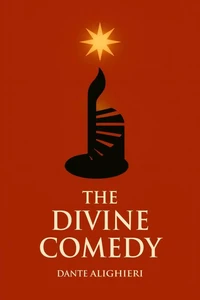The Divine Comedy describes Dante's journey through Hell (Inferno), Purgatory (Purgatorio), and Paradise (Paradiso), guided first by the Roman poet Virgil and then by Beatrice, the subject of his love and of another of his works, La Vita Nuova. While the vision of Hell, the Inferno, is vivid for modern readers, the theological niceties presented in the other books require a certain amount of patience and knowledge to appreciate.
Purgatorio, the most lyrical and human of the three, also has the most poets in it; Paradiso, the most heavily theological, has the most beautiful and ecstatic mystic passages in which Dante tries to describe what he confesses he is unable to convey (e.g., when Dante looks into the face of God: "all'alta fantasia qui mancò possa" - "at this high moment, ability failed my capacity to describe, " Paradiso, XXXIII, 142).
"IN the midway of this our mortal life, I found me in a gloomy wood, astray Gone from the path direct: and e'en to tell It were no easy task, how savage wild That forest, how robust and rough its growth, Which to remember only, my dismay Renews, in bitterness not far from death.." (Dante)
IN the midway of this our mortal life,
I found me in a gloomy wood, astray
Gone from the path direct: and e'en to tell
It were no easy task, how savage wild
That forest, how robust and rough its growth,
Which to remember only, my dismay
Renews, in bitterness not far from death.
Yet to discourse of what there good befell,
All else will I relate discover'd there.
How first I enter'd it I scarce can say,
Such sleepy dullness in that instant weigh'd
My senses down, when the true path I left,
But when a mountain's foot I reach'd, where clos'd
The valley, that had pierc'd my heart with dread,
I look'd aloft, and saw his shoulders broad
Already vested with that planet's beam,
Who leads all wanderers safe through every way.
Then was a little respite to the fear,
That in my heart's recesses deep had lain,
All of that night, so pitifully pass'd:
And as a man, with difficult short breath,
Forespent with toiling, 'scap'd from sea to shore,
Turns to the perilous wide waste, and stands
At gaze; e'en so my spirit, that yet fail'd
Struggling with terror, turn'd to view the straits,
That none hath pass'd and liv'd.
My weary frame
After short pause recomforted, again
I journey'd on over that lonely steep,
The hinder foot still firmer. Scarce the ascent
Began, when, lo! a panther, nimble, light,
And cover'd with a speckled skin, appear'd,
Nor, when it saw me, vanish'd, rather strove
To check my onward going; that ofttimes
With purpose to retrace my steps I turn'd.
The Divine Comedy describes Dante's journey through Hell (Inferno), Purgatory (Purgatorio), and Paradise (Paradiso), guided first by the Roman poet Virgil and then by Beatrice, the subject of his love and of another of his works, La Vita Nuova. While the vision of Hell, the Inferno, is vivid for modern readers, the theological niceties presented in the other books require a certain amount of patience and knowledge to appreciate.
Purgatorio, the most lyrical and human of the three, also has the most poets in it; Paradiso, the most heavily theological, has the most beautiful and ecstatic mystic passages in which Dante tries to describe what he confesses he is unable to convey (e.g., when Dante looks into the face of God: "all'alta fantasia qui mancò possa" - "at this high moment, ability failed my capacity to describe, " Paradiso, XXXIII, 142).
"IN the midway of this our mortal life, I found me in a gloomy wood, astray Gone from the path direct: and e'en to tell It were no easy task, how savage wild That forest, how robust and rough its growth, Which to remember only, my dismay Renews, in bitterness not far from death.." (Dante)
IN the midway of this our mortal life,
I found me in a gloomy wood, astray
Gone from the path direct: and e'en to tell
It were no easy task, how savage wild
That forest, how robust and rough its growth,
Which to remember only, my dismay
Renews, in bitterness not far from death.
Yet to discourse of what there good befell,
All else will I relate discover'd there.
How first I enter'd it I scarce can say,
Such sleepy dullness in that instant weigh'd
My senses down, when the true path I left,
But when a mountain's foot I reach'd, where clos'd
The valley, that had pierc'd my heart with dread,
I look'd aloft, and saw his shoulders broad
Already vested with that planet's beam,
Who leads all wanderers safe through every way.
Then was a little respite to the fear,
That in my heart's recesses deep had lain,
All of that night, so pitifully pass'd:
And as a man, with difficult short breath,
Forespent with toiling, 'scap'd from sea to shore,
Turns to the perilous wide waste, and stands
At gaze; e'en so my spirit, that yet fail'd
Struggling with terror, turn'd to view the straits,
That none hath pass'd and liv'd.
My weary frame
After short pause recomforted, again
I journey'd on over that lonely steep,
The hinder foot still firmer. Scarce the ascent
Began, when, lo! a panther, nimble, light,
And cover'd with a speckled skin, appear'd,
Nor, when it saw me, vanish'd, rather strove
To check my onward going; that ofttimes
With purpose to retrace my steps I turn'd.

 , qui est-ce ?
, qui est-ce ?